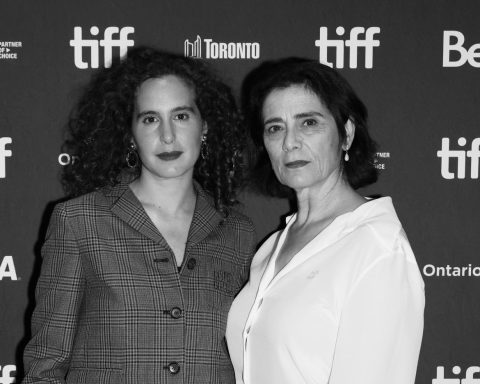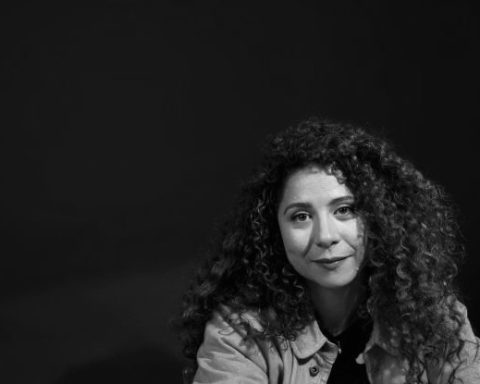Mahalia Belo’s latest film, The End We Start From, is a difficult, precise and touching yet psychologically taxing apocalyptic drama that leaves nobody indifferent. The film world premiered at the Toronto International Film Festival.
One day, in the future, a new mother, her partner and their baby are forced out of London by cataclysmic floods and have to make their way to his parents’ home in the countryside, where, they discover, the situation is no better and is growing progressively critical and hopeless.
Mahalia Belo and Alice Birch adapt Megan Hunter’s oracular 2017 novel and craft a simple and elliptical film. They keep the disaster off-screen and let the actors bear the pressure and tension of the story on their faces and bodies as the world slowly crumbles and shrinks around them, leaving it scarier than ever before. When the floods start, Belo brilliantly uses them to mirror child birth and it is the most potent depiction of birth seen on film. It is a fully immersive experience and if you’ve ever given birth and if you ever see this film, you’ll know what I’m talking about. New motherhood is shown here in all its factual glory and it is refreshing to see something so true to life without any artifice depicted on screen.
The heartbeat of this bleak yet exceptionally detailed and thoughtfully crafted film is the extraordinary performances, most notably by Jodie Comer who spectacularly embodies a new mother and balances her physical and psychological inner turmoil and exhaustion with an indomitable force of life, and the superb supporting turns by Benedict Cumberbatch, Joel Fry, Mark Strong, Katherine Waterston, Alexandria Riley and Gina McKee who all nimbly convey the various levels of fear, exhaustion and despair.
Suzie Lavelle’s unobtrusive crisp and somber lensing with spectacular wide shots of the British foggy forest landscape adds emotional weight to the already gloomy scenario and scenery. But the nature offers hope. It is so immersive that it is difficult not to be engaged and Belo does it very carefully and sucks us emotionally into this physically and psychologically suffocating realm. The best moments and most effective scenes come from the friendship between Jodie Comer and Katherine Waterston’s characters (the latter is utterly unfazed by the whole situation) and are actually the conduits used by Belo to contrast female strength with male vulnerability and the achieved balance is soul-shatteringly truthful and constructed with telling effect. What sets this film apart is that this is an apocalyptic film with a female gaze (and made by an almost all-female crew) and that is a breath of fresh air. Belo shrewdly presents us with a picture of apocalypse from a perspective of womanhood and new motherhood embedded in the universal and individual experiences of apocalyptic doom – they are fearless, fierce and entrepreneurial.
While it may be difficult to watch and it not only posits interesting questions about our future and offers alarming warnings, but also hope, it is an immersive, intimate and raw cinematic experience that begs to be lived. Belo’s gaze is unique, progressive and bold and one that needs and deserves to be seen.
Production: Sunnymarch, Hera Pictures, Anton, C2 Motion Picture Group, BBC Film, BFI (UK 2023). Producers: Adam Ackland, Leah Clarke, Sophie Hunter, Amy Jackson, Liza Marshall. Executive Producers: Dave Caplan, Jason Cloth, Jodie Comer, Benedict Cumberbatch, Pieter Engels, Lizzie Francke, Cécile Gaget, Suraj Maraboyina, Kate Maxwell, Fani Ntavelou-Baum, Sébastien Raybaud, Fanny Soulier, Mark Strong, Eva Yates, Claudia Yusef. Associate producer: Ruth Sweeney. Line producer: Donna Mabey.
Director: Mahalia Belo. Screenplay: Alice Birch, based on the novel by Megan Hunter. Cinematography: Suzie Lavelle. Costume Design: PC Williams. Production Design: Laura Ellis Cricks. Score: Anna Meredith. Editing: Arttu Salmi.
Cast: Jodie Comer, Joel Fry,, Benedict Cumberbatch, Mark Strong, Katherine Waterston, Gina Mckee, Alexandria Riley.
Color – 102 min. Premiere: 10-IX-2023 (Toronto International Film Festival)
Photo credits: Courtesy of TIFF.









